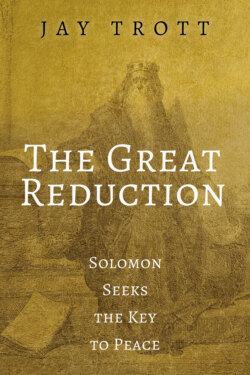Читать книгу The Great Reduction - Jay Trott - Страница 11
На сайте Литреса книга снята с продажи.
The rivers run into the sea, and yet the sea is never full.
ОглавлениеThis could be Solomon’s motto. Think of the sea as identity. All the rivers of his highly productive life ran into this thirsty sea, but it can never be filled because he could never give himself the one thing he really wanted, the only thing that could make him happy.
And this one thing is life. The desire for an enduring identity is the engine of all our striving, and it is rooted in the desire for life. We don’t want fame for its own sake; we want fame because we want our identity to live. This shows that our highest value is life.
The Bible is unique in linking happiness to the desire for life. Adam and Eve were in paradise as long as they had access to the tree of life; their misery commenced when they were cut off permanently from that tree. That’s a poetic way of saying only life can make us happy.
“The people living in darkness have seen a great light.” But what is this light? It is the resurrected life. Christ is glorified specifically because he obtained life. “In him was life, and this life was the light of the world.” John links the happiness that is found in him directly to life.
Today we have another tree that gives us access to life. But Solomon knew nothing of this tree. He was among the people living in darkness. All his life he tried to obtain happiness by being a superstar. What he was actually trying to obtain, without knowing it, was life.
All the rivers of his ambition flowed into this sea, but it was never full. There was no rest for him, no respite from his labors, because it was not possible to obtain the happiness of life. And now he is beginning to see the futility of all his striving.
We are told there is a river that can satisfy eternal longings, the same river that “makes glad the city of God.” Ezekiel saw it, and it was last seen flowing down the streets of the new Jerusalem, quickening everything it touches, turning brown branches into life.
This river can fill the sea of our longing because it represents the Spirit, who is the Lord and giver of life. But the age of the Spirit had not yet come. All Solomon could see from his disadvantaged viewpoint was the futility and weariness of striving to make himself happy.
Unto the place from whence the rivers come, there they return again.
Solomon’s great soul-weariness is marked by the theme of the perpetual return, which he will bring up repeatedly.
We will ask your permission, dear reader, to use this term without invoking Nietzsche or Buddhism or the “eternal return,” the reincarnation meme, which is a very different thing.
Aristotle tells us all good stories have a beginning, a middle, and an ending. That’s because all good stories are rooted in identity. They have an ending because identity requires closure in order to be happy. The ending sets the story and the identity it provides apart from other stories.
But Solomon has seen something terrifying: the rivers return from whence they came. God’s artfulness in providing for our needs—the cycles through which evaporation of the seas brings us clouds and rain and rivers return to the sea—has become oppressive to him by taking away happy endings.
The rivers are always returning to themselves. And the same is true of the rivers of striving that we pour into the sea of unfulfilled desire. The moment we see them returning, the ending of the story is undone, and it is no longer possible for our endeavors to make us happy.
It now occurs to Solomon that the stories he has been telling himself do not have a happy ending. He thought he was accomplishing something when he was participating in the perpetual return. Nature never grows weary in her cycles, but this is not the case with old men, as he is about to tell us.
